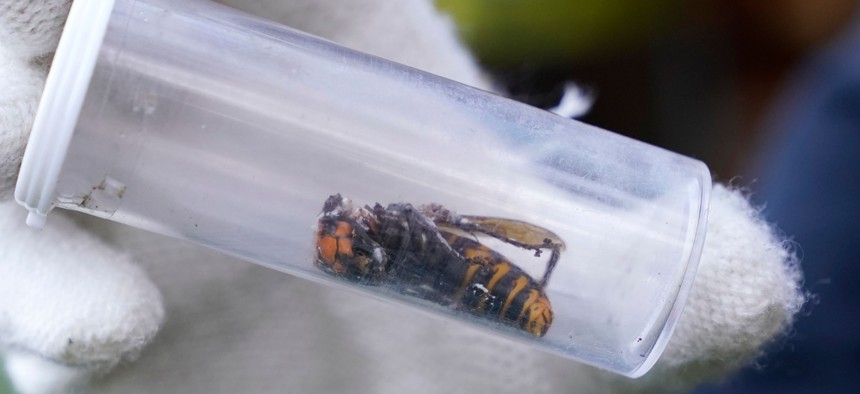Murder Hornets in US Being Trapped With ‘Sex Spray’

A Washington State Department of Agriculture worker displays an Asian giant hornet taken from a nest on October 24, 2020, in Blaine, Washington GettyImages/ ELAINE THOMPSON
The Asian giant hornet is killing honeybees in the west and may migrate east, which could have a devastating economic impact.
An invasive hornet species has invaded parts of the western U.S., killing honeybees that are crucial to agriculture, which could have a devastating economic impact, according to one scientist. To keep the bugs from migrating east, researchers are employing an insect sex spray to lure large swarms of male hornets to their death.
The Asian giant hornet, also known as the “murder hornet,” is found in South and Southeast Asia and parts of East Asia, and migrated to the U.S. in late 2020. Some scientific simulations indicate that it could rapidly spread throughout Washington and Oregon as well as some eastern parts of the country, according to researchers.
The rumors are true - our entomologists located the first-ever #AsianGiantHornet nest in the U.S. late yesterday. Press conference at 2 p.m. pic.twitter.com/oXuE6urXff
— Washington State Department of Agriculture (@WSDAgov) October 23, 2020
While scientists are unsure how the hornets arrived in the U.S., professor James Nieh at the University of California San Diego and lead researcher of a giant hornet study, thinks they were illegally imported or hitched a ride on a shipping container.
The insect’s arrival in America is threatening to wreack havoc on honeybee colonies and crop fields, putting the livelihood of people at stake, Nieh said. A single hornet can kill hundreds of honey bees to obtain their larvae.They also pose dangers to humans because they have powerful stings that are painful and, in rare cases, deadly, according to research done by Nieh.
“The problem is twofold: We depend upon honeybees for a lot of crop pollination in the U.S., but our species of honeybees do not have a defense against these hornets, leaving them quite vulnerable," Nieh told RouteFifty. "And that could have a very large economic impact."
But scientists in the U.S. believe they found a way to stop the hornets’ migration east by using compelling odors produced by a hornet queen as bait to trap and track the insects in a sticky contraption that is similar to a mouse trap.
The scientists found that the male hornet is drawn to the scent of the queen’s pheromones. After traps were placed and the male hornets were bamboozled by the scent into thinking they might find a breeding opportunity, scientists were able to capture thousands of male hornets.
Many thanks to my Chinese collaborators for this research identifying some of the major components of giant hornet (Vespa mandarinia) female sex pheromone.
— James C. Nieh (@jcnieh) March 14, 2022
Your article link:https://t.co/RuzPxVdKn9 pic.twitter.com/XqotQdxR79
Nieh said that Asian hornets are difficult to control because their colonies can spread rapidly, and their nests are difficult to find in nonurban areas.
“We hope that others, especially in invaded areas, will take the protocol we have established and test this method," Nieh told The Independent, an online British newspaper.
Andre Claudio is an assistant editor at Route Fifty.
NEXT STORY: Cities and Towns Across This State are Electing Female Mayors at Record Rates





